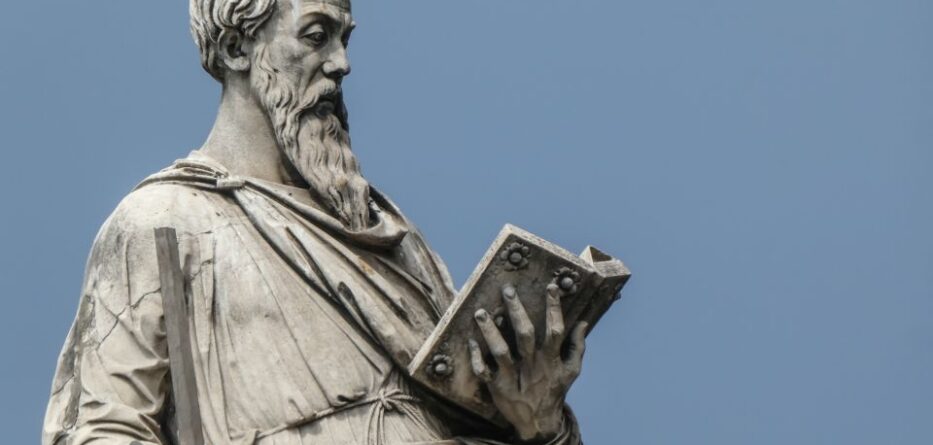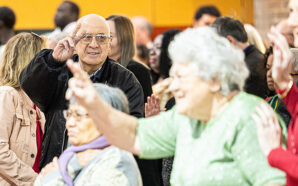Homily for the Feast of Saints Peter and Paul
29 June 2025
Readings: Acts 12:1-11; Psalm 34; 2 Timothy 4:6-8;17-18; Matthew 16:13-19
Listen at soundcloud.com
What a crazy week it has been. From hour to hour, day to day, everyone seemed to be hanging on the word of Donald Trump. None of us was surprised that Iran’s Ayatollah Ali Khamenei was publicly invoking the divine. But then we had Donald Trump declaring from the presidential podium: ‘And in particular, God, I want to just say, we love you God, and we love our great military. Protect them. God bless the Middle East, God bless Israel, and God bless America.’
The US which at last count has 5,277 nuclear warheads had joined forces with Israel which is one of nine countries with nuclear weapons. The Israelis are thought to have about 90 nuclear warheads.[1] Mr Trump was announcing a successful strike by US aircraft on facilities in Iran. I’m one who hopes that Iran is not on the path to producing a nuclear weapon. How best to assure that in the long term will be debated for some time to come – whether it be by bold military strikes or by painstaking negotiation. Whatever the outcome of last week’s raids, we know that we are no longer living under an international rules based order. The world is in a fragile difficult place.
When Pope Francis visited the Atomic Bomb Hypocenter Park in Nagasaki in 2019 he said: ‘One of the deepest longings of the human heart is for security, peace and stability. The possession of nuclear and other weapons of mass destruction is not the answer to this desire; indeed they seem always to thwart it. Our world is marked by a perverse dichotomy that tries to defend and ensure stability and peace through a false sense of security sustained by a mentality of fear and mistrust, one that ends up poisoning relationships between peoples and obstructing any form of dialogue. Peace and international stability are incompatible with attempts to build upon the fear of mutual destruction or the threat of total annihilation. They can be achieved only on the basis of a global ethic of solidarity and cooperation in the service of a future shaped by interdependence and shared responsibility in the whole human family of today and tomorrow.’[2]
Francis went on to say: ‘Convinced as I am that a world without nuclear weapons is possible and necessary, I ask political leaders not to forget that these weapons cannot protect us from current threats to national and international security. We need to ponder the catastrophic impact of their deployment, especially from a humanitarian and environmental standpoint, and reject heightening a climate of fear, mistrust and hostility fomented by nuclear doctrines.’
Like the Ayatollah and the President last week, Pope Francis went on to invoke God when at Nagasaki in 2019, concluding: ‘In this striking place of remembrance that stirs us from our indifference, it is all the more meaningful that we turn to God with trust, asking him to teach us to be effective instruments of peace and to make every effort not to repeat the mistakes of the past.’ No doubt many people, including good Catholics, do not share Francis’s conviction that a world without nuclear weapons is both possible and necessary. But we all need to work towards that outcome for the good of your children and grandchildren, and for the good of the planet. And we need to pray to God for that outcome.
Today we celebrate the feast of Saints Peter and Paul. Pope Leo will bestow the pallium, a woollen band, over the chasuble of each new archbishop in attendance this day in Rome. The pallium is a symbol of the archbishop’s authority over his province. At his own mass of installation as pope, Leo received the pallium which was brought up from the entrance of the tomb of Peter. Then Cardinal Tagle movingly placed the papal ring on Leo’s finger. With all the liturgies surrounding the death of Francis and the election and installation of Leo, we have been rather focused on Peter rather than on Paul. So today, let’s turn our attention to Paul.
It’s traditional for a new pope to make a visit to St Paul’s Outside the Walls early in his pontificate. When John Paul II did so, he recalled that Peter and Paul had both come to Rome ‘for the same purpose: to bear witness to Christ’. They both suffered death for bearing witness. Tradition has it that they died on the same day. But their ministries were very different. John Paul offered this reflection on the ministry of Paul: ‘Rome was not the only goal of the apostolic life and pilgrimage of Paul of Tarsus. It should rather be said that his aim was the universum of the Roman empire of that time (as his journeys and his letters testify). Rome was the last stage of these journeys. Paul arrived here already as a captive, imprisoned for the cause to which he had dedicated himself entirely: the cause of universalism’.[3] As the Preface in today’s mass puts it: ‘Peter raised up the Church from the faithful flock of Israel. Paul brought your call to the nations, and became the teacher to the world.’ In his Letter to the Galatians, Paul had insisted that the gospel he preached was not received from any of the apostles in Jerusalem, nor was he taught it by them; rather, he received it directly by revelation from Jesus Christ. After his radical conversion at Damascus, he spent time in Arabia and waited for three years preaching to the Gentiles before he went up to Jerusalem to meet Peter and James, and then only for a mere 15 days.
On this feast of Peter and Paul, we pray for Pope Leo that he might combine the Petrine and Pauline aspects of his ministry, leading us, as did his predecessor Francis, with a universal call for the destruction of all nuclear weapons.
The angel of the Lord will rescue those who fear him.
I will bless the Lord at all times;
his praise shall be ever in my mouth.
Let my soul glory in the Lord;
the lowly will hear me and be glad.
The angel of the Lord will rescue those who fear him.
Glorify the Lord with me,
let us together extol the Lord’s name.
I sought the Lord, and the Lord answered me
and delivered me from all my fears.
The angel of the Lord will rescue those who fear him.
Look to the Lord that you may be radiant with joy,
and your faces may not blush with shame.
When the poor one called out, the Lord heard,
and from all her distress he saved her.
The angel of the Lord will rescue those who fear him.
The angel of the Lord encamps
around those who fear him, and delivers them.
Taste and see how good the Lord is;
blessed the person who takes refuge in him.
The angel of the Lord will rescue those who fear him.
Fr Frank Brennan SJ is serving as part of a Jesuit team of priests working within a new configuration of the Toowong, St Lucia and Indooroopilly parishes in the Archdiocese of Brisbane. Frank Brennan SJ is Adjunct Professor of the Thomas More Law School at ACU and is a former CEO of Catholic Social Services Australia (CSSA). Fr Frank’s latest book is An Indigenous Voice to Parliament: Considering a Constitutional Bridge, Garratt Publishing, 2023 and his new book is ‘Lessons from Our Failure to Build a Constitutional Bridge in the 2023 Referendum’ (Connor Court, 2024).
[1] See https://www.icanw.org/nuclear_arsenals. Russia tops the lot with 5,449 nuclear warheads.
[2] See https://www.vatican.va/content/francesco/en/messages/pont-messages/2019/documents/papa-francesco_20191124_messaggio-arminucleari-nagasaki.html
[3] See https://www.vatican.va/content/john-paul-ii/en/homilies/1978/documents/hf_jp-ii_hom_19781217_basilica-san-paolo.html








